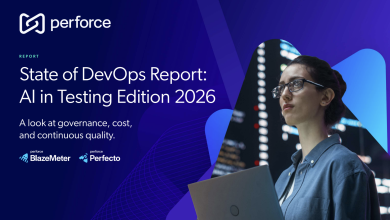
The interaction between humans and machines has entered a new realm recently as artificial intelligence (AI) continues to split opinion for both individuals and businesses. Despite economic challenges, business growth was found to be the top strategic priority for almost half (49%) of CEOs across the world, and generative AI, in particular, is set to “profoundly impact business and operating models” across every industry, according to Gartner analyst Mark Raskino.
In fact, over a fifth of CEOs globally believe that AI will significantly impact their industry over the next three years, evidence that this revolution isn’t slowing down anytime soon.
Key considerations before starting the AI journey
In today’s increasingly competitive business landscape, where consumer expectations have grown monumentally, the benefits of AI really become clear. From healthcare to manufacturing, AI holds the promise of transforming every industry, disrupting traditional products and services, and reinventing business practices for everyone from end users to CEOs.
The main benefit of AI for organizations is that it gives members of the C-suite – particularly the CIO – access to insights they need to automate processes, enhance customer experience, make more informed decisions, reduce operational costs, and drive competitive advantage in the digital age.
While AI excels at processing large amounts of data and performing repetitive tasks, it is not without risks. We’ve already seen news headlines reporting serious issues in the form of misinformation, deepfakes, cyberattacks, and, most worryingly, mass job losses. There is also the danger that such technology could introduce risks of its own, particularly in terms of company reputation.
Although AI can be a powerful tool to support decision-making, in cases where AI systems base assumptions on patterns of historical data, there is a danger of bias. An example of this is in 2018, prior to new models such as OpenAI’s ChatGPT and Google Bard emerging, Amazon reportedly scrapped an AI recruitment tool that was biased towards men. Businesses need to understand their data and what it’s telling them whilst keeping their organizations values firmly in mind.
But, contrary to these concerns about automation displacing workers and hindering business processes, technological advancements such as AI can and should work in unison with human beings to help assist and transform the future of financial and strategic planning. The challenge occurs when organizations shift the focus away from using the software as a decision-support tool towards allowing it to make decisions without human intervention.
How human and AI collaboration will redefine financial planning
Traditional methods and technologies for managing business finances are no longer sufficient. Companies are having to plan and forecast more frequently and in even shorter cycles. However data collection, decisions on future direction, and creating a coherent plan across departments and hierarchies take time and can be challenging with fewer human resources available in certain specialist departments.
AI and Machine Learning (ML) have the potential to bridge the gap between increased planning needs and reduced resource availability. ML introduces new flexibility to financial business planning and forecasting by providing predictive modeling, scenario-based planning, control, and validation processes. IT Financial Management (ITFM) or Technology Business Management (TBM) tools have
become essential for businesses as they provide access to real-time operational data and enable today’s CIO to manage IT budgets against the rising pressure to invest. Through embracing AI, organizations can automate clunky, manual processes, which subsequently helps to improve the employee experience and enable more meaningful work.
The cost of neglecting customer experience
It’s important to remember that in today’s turbulent economic environment, whilst cost is a top priority, so too is keeping service customers satisfied. This is a critical factor in determining customer loyalty and retention. For many businesses, the cost of losing customers can be detrimental.
According to research, digital customer experience (DCX) continues to evolve as a priority with 79% of people indicating that DCX is extremely or very important. While budgets are being squeezed, businesses must still ensure service performance is optimized.
Thanks to automation and AI, companies can significantly increase the efficiency and quality of their services and sustainably take their service promise to the next level. IT service management (ITSM)—the management and support of IT services—is an integral part of customer services and therefore it’s important to keep it optimized and streamlined where possible.
It encompasses problem management, incident management, change and release management, as well as financial management. AI automates routine tasks like ticket classification, finds answers to users’ queries and generates email replies, speeding up response times and boosting the service agent’s productivity. For example, an AI-powered chatbot can be employed to answer common customer questions, serve content, collect user data, and provide support.
The power of turning AI into business value
Regardless of the industry, AI has the potential to allow organizations to remain competitive whilst pursuing new directions with their products and services. As we head into 2024, business leaders must invest in AI-powered solutions to stay ahead – not just in terms of strategic decision-making and financial planning, but also revolutionizing customer service and enhancing the overall customer experience.



